Architect Da Xiong and his Heartland Farm on Chongming Island

By 2008, Da Xiong had been working in Shanghai for many years, running a company and doing design work, but the sense of freedom from growing up in the countryside had etched itself into his memory.

When Da Xiong was 36 years old, and his first daughter with his wife Moqi was about to be born. They sold their house in the center of Shanghai and returned to Da Xiong's hometown for five carefree years. When their eldest daughter turned five, they moved back to Moqi's hometown, Chongming Island, for the convenience of the child's education.

Da Xiong found an 18-acre piece of semi-wild land next to a river, with scattered fields but also fragrant camphor forests, large Chinese toon trees, and bamboo groves. He decided to create a natural homestead here.

The Construction of Heartland
For the construction of the homestead, Da Xiong was responsible for designing and building the farm; Moqi managed the land production; Da Xiong's mother-in-law, Teacher Yang, a Chongming earth cloth inheritor, helped coordinate neighborhood relations, recruit construction teams, and took on the task of shuttling children to and from school; Da Xiong's father-in-law also supported from behind the scenes.

Moqi's farming methods embody the concept of "Permaculture Sustainable Design." Today, Heartland Farm not only has rice paddies but also a food garden consisting of tomatoes, eggplants, loofahs, grapes, strawberries, and peaches, providing enough for the family to be self-sufficient and host guests.
Organic Farming
Farming activities strictly follow the seasons, using traditional seeds that have been passed down for generations, promoting biodiversity, and avoiding pesticides, chemical fertilizers, and herbicides.

A group of ducks is raised in the rice paddies, forming a "rice-duck co-cultivation" system: the rice paddies provide for the ducks, and the ducks, in turn, eat insects, fertilize, and weed the rice paddies.

Two main bathrooms/showers, "Moonlight No. 1" and "Moonlight No. 2," are located in the rice paddies. The cone-shaped Moonlight structures are enclosed by bamboo and Chongming earth cloth. Toilet pipes are connected to underground fermenting tanks, which supply nutrients to the rice paddies and vegetable fields.

When Da Xiong planned Heartland Farm, he adhered to the principle of learning from nature and ensuring that all space facilities are based on the functional needs of clothing, food, housing, and transportation.
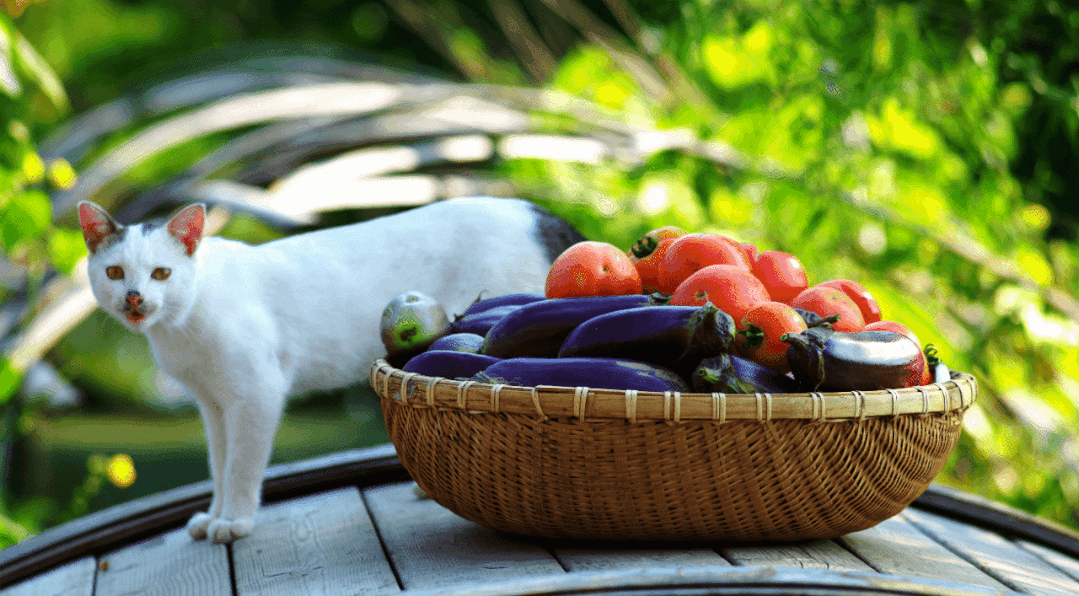
He mimicked the natural shape of the water's edge, making the lotus pond's shoreline winding and lengthy. This not only provides a place for the family to play but is also a successful ecological design that allows the pond connected to running water to produce a natural water's edge effect.
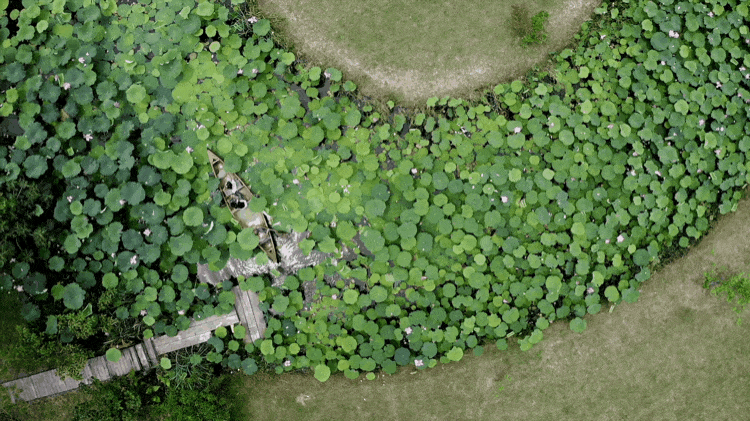
Outdoor Kitchen
The centerpiece of Heartland Farm is a semi-outdoor field kitchen. The kitchen not only has cookware, farm tools, various stoves, ovens, and traditional pressure water pumps but also has a sink and faucet with water that can be directly consumed, just like a modern kitchen.

The Basecamp
Next to the field kitchen on the left is the steel-structured "Basecamp". There are no air conditioners installed in farm. On the roof of the Basecamp, a row of metal spheres continuously rotate, serving as devices that aid in indoor air circulation.

Weaving
Influenced by his mother, Moqi can also weave local fabric.
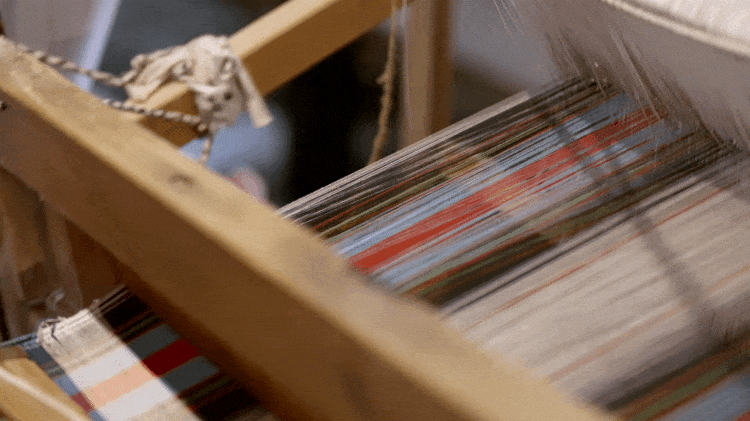
The Basecamp is built above the internal roads and small river running through the farm, without occupying any farmland. The family's wooden living quarters and spacious public areas are embedded within.

Woodworking workshop
Daxiong's studio and woodworking workshop are also located in the Basecamp.

From doors, windows, tables, chairs, floors, to boathouses and boardwalks, wood is visible everywhere in the farm. The woodworking workshop provides a continuous source of energy for the growth of the entire farm. Chen Zhongguo, a carpenter from Chongming Island, is Daxiong's ideal partner in building the farm.
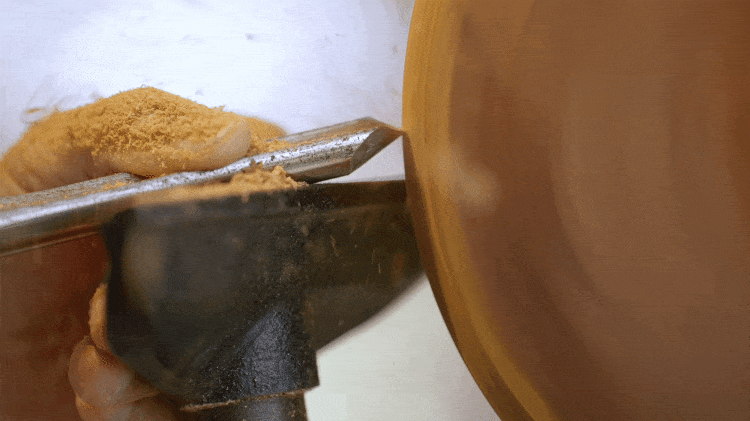
Boat Building
Daxiong and Master Chen have also researched and built the island's first modern wooden boat: a lightweight modern canoe made of cedar wood, using Western techniques.

These boats can be easily lifted, placed on car roofs, and taken by their owners to suitable outdoor water areas for leisurely boating.
Boating on Chongming
Daxiong designed a "sunset route" for friends and guests visiting Heartland. Setting out by boat before sunset, visitors can experience the surrounding ecology and human settlements from a close-to-water perspective. He hopes to help revive Chongming Island's canal culture.

A Family of Four in the Boathouse
Daxiong has set up a "dock" for each boat that can be launched, and each "dock" is paired with a cedar boathouse, like a waterfront guesthouse. Most of the boathouses have large windows or even a dozen doors facing the rice fields, providing unobstructed ventilation.
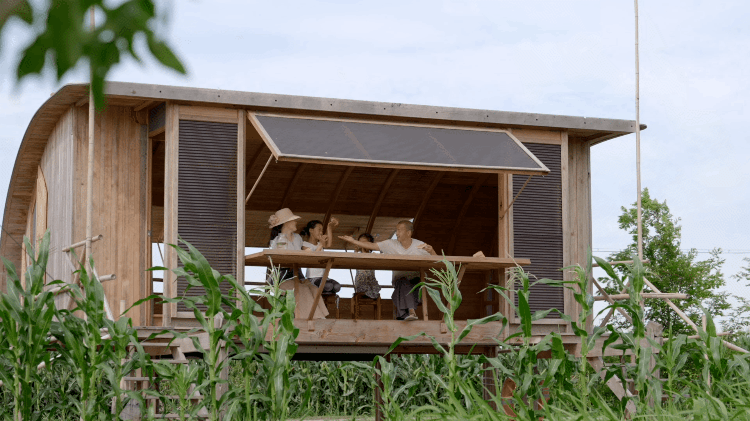
As the most basic needs of clothing, food, housing, and transportation are properly arranged, how can higher-level needs be met? Daxiong also hopes to make this home a shared natural campsite for many others.

He continues to build houses. Every winter, he goes to the beach to collect reeds and bamboo, the island's ecological building materials.

Rice Field Theater
The circular "rice field theater" next to the field kitchen is a representative venue utilizing reeds, bamboo, and cedar wood.

Hundreds of 10-meter-long bamboo poles overlap to form a pyramid-shaped structure as the roof, covered with reeds on the outer layer. The central ground of the rice field theater is paved with gravel, surrounded by a circle of cedar planks, suitable for yoga, meditation, solitude, or leisurely conversation.
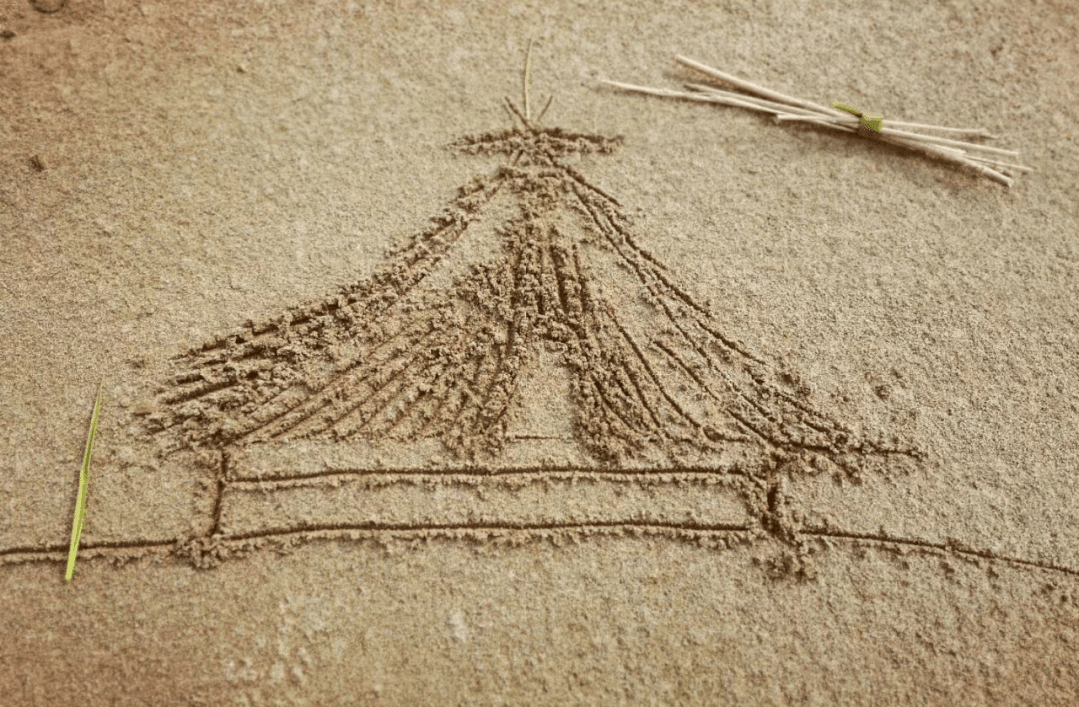

Thatched Pavilion
There are east and west rice fields in Heartland, and the harvested straw is preserved every year. At the beginning of the year, Daxiong built a pavilion-style "thatched pavilion" by the field, with a wooden structure covered in a large amount of straw and a roof resembling a giant haystack.
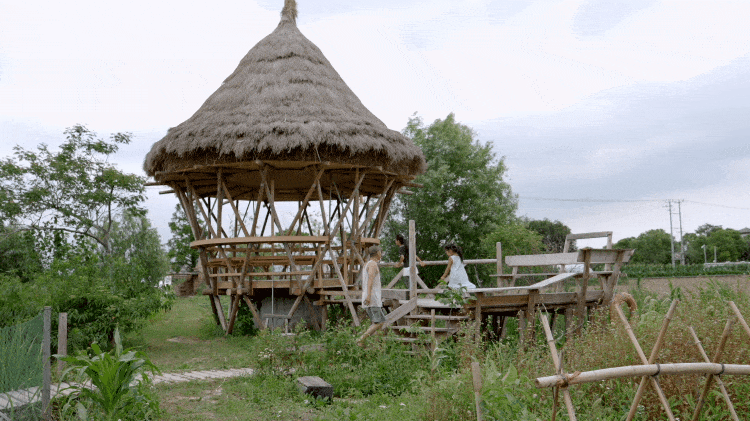
Cedar Wood House
On the second floor of the main base, there is a fascinating room: a pyramid-shaped cedar wood house. It faces the direction of the sunrise, receiving the first rays of sunlight from the farm.
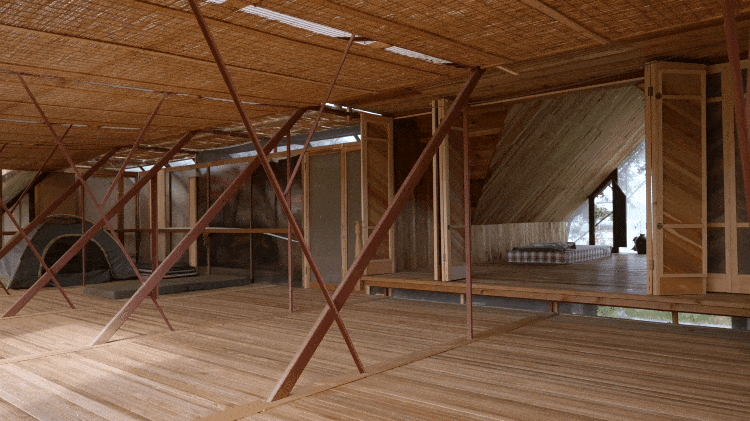
Da Xiong says, "After I finished building this room, I slept in it for one night, and I even wrote a poem that day. The sunlight, cedar, and overall environment were in perfect harmony, as if they could enlighten people."

The Daughters
His two daughters, Chu Chu and Chun Chun, are growing up very freely.
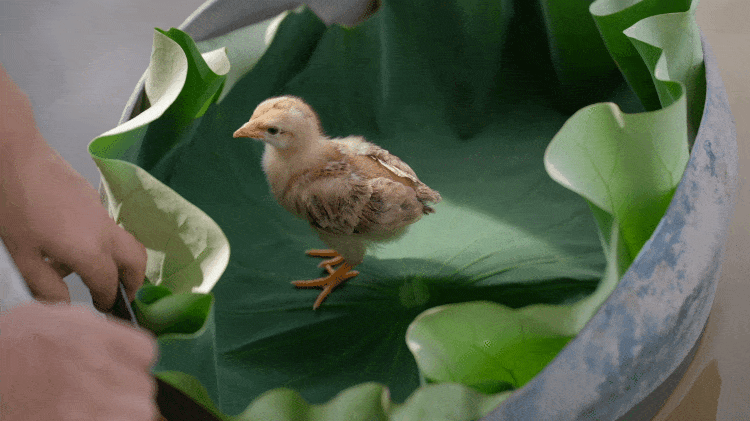
Da Xiong reflects, "Let them explore and grow in a free and relaxed environment, rather than being constantly disciplined and restrained. I believe that if a childhood is not free, one's entire life will not be free. Children possess an innate vitality and original power, so similar to the natural rhythm of all things renewing."
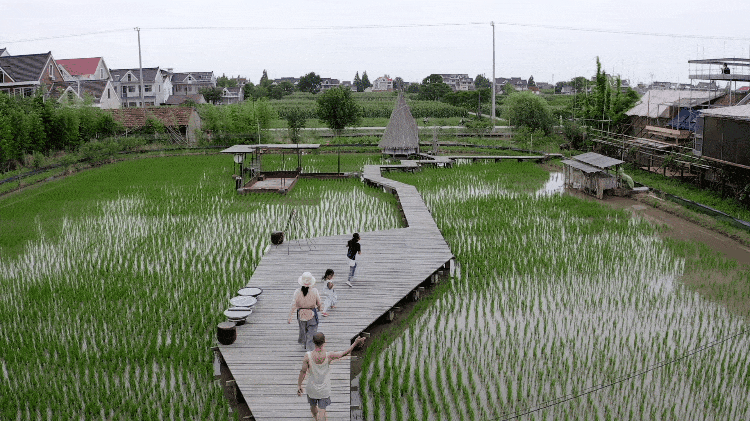
The House Rules
Da Xiong says, "When people contact me and book a visit, I will clearly inform them of the rules. For example, tea and coffee are available, but you must make and drink them yourself. The field kitchen is open to everyone, and self-service is welcome. We can, of course, provide ready-made meals, but due to limited staff and ingredients, we strictly follow a reservation system." Accommodation rules are much more flexible: guests can stay in a boathouse, the pine house at the main base, rent a tent, or even bring their own tent and bedding for camping as they please.
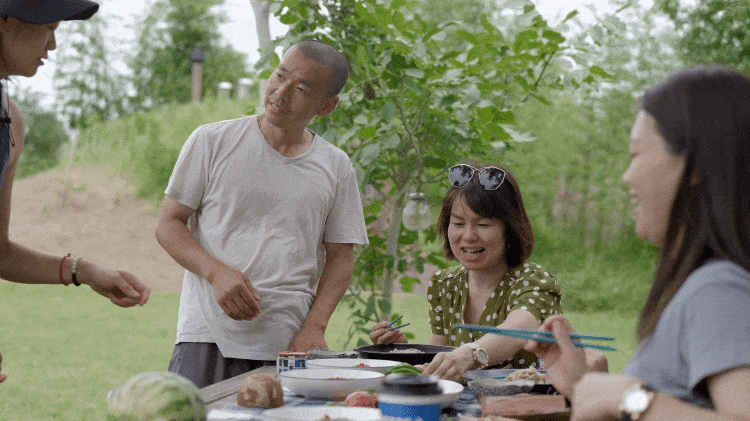
These unconventional rules leave breathing room for the whole family's life and also allow them to inadvertently make the acquaintance of many interesting volunteer partners.
What this family is exploring is how to survive in nature and live in the fields in a modern environment.

"We've encountered all the difficulties we should have: technical, economic, and spiritual... I am still a designer with perfectionist tendencies. Building in the uncontrollable nature often drives me 'crazy.' In fact, there is no good or bad between the city and the countryside; where you settle is just a choice. Generally speaking, our life is not influenced by external trends or rhythms, and we can decide our daily life as we wish. So, continue to build and create towards your own goals, realize your dreams, and maybe, help others at the same time."

Da Xiong and his family have crafted a unique and harmonious life that intertwines with nature, embracing the challenges and joys that come with it. They have created a space that fosters creativity, growth, and freedom, not only for themselves but also for their visitors. By redefining the traditional norms of living, they have demonstrated that it is possible to find a balance between modernity and the natural world. Their inspiring journey encourages us all to reevaluate our relationship with our surroundings and consider the importance of living in harmony with nature, as we strive to achieve our dreams and support others along the way.